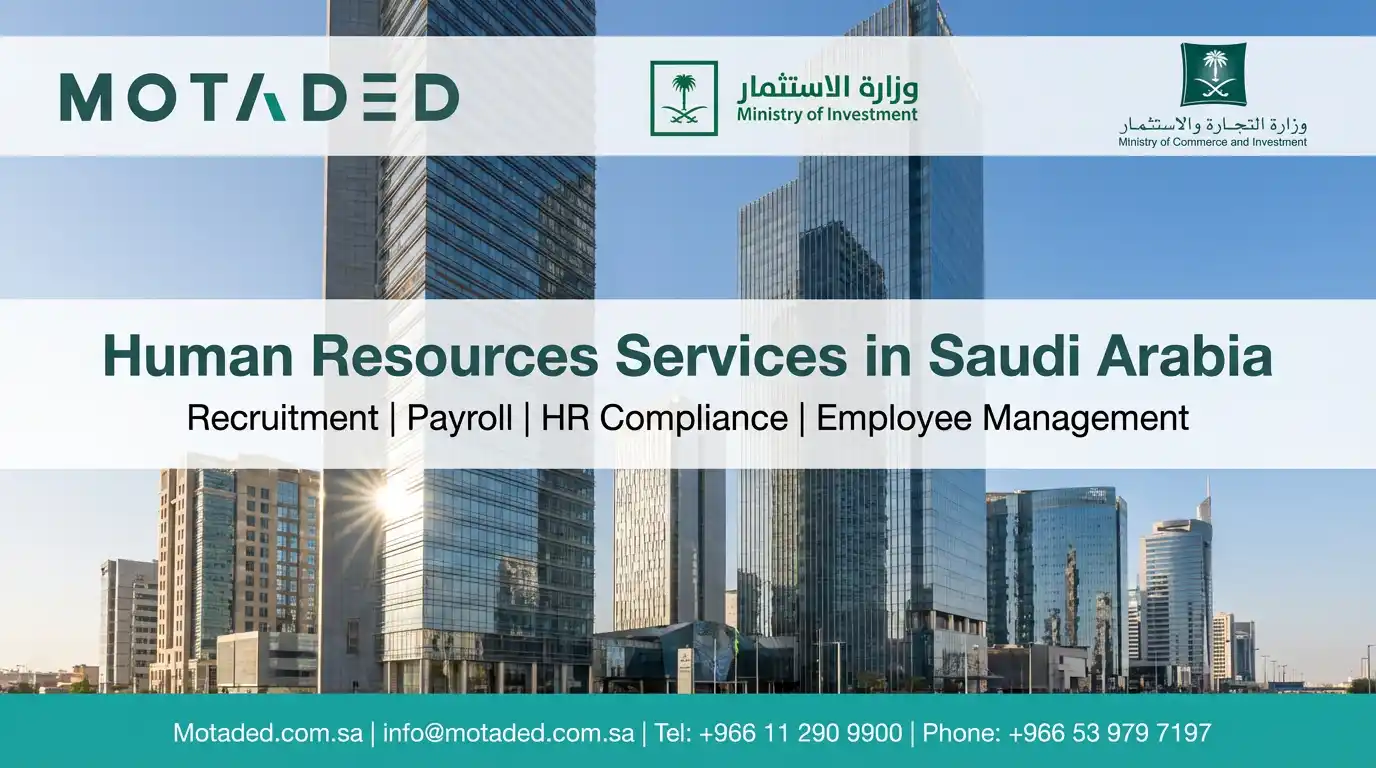Human Sovereignty 2026: The Encyclopedic Thesis on HR Governance and Digital Transformation in Saudi Arabia
In 2026, the Human Resources (HR) sector in Saudi Arabia represents the primary "Procedural Fortress" ensuring the sustainable financial solvency of billion-dollar enterprises. The role of HR management is no longer confined to traditional administrative operations; it has become a proactive process of Formulating human capital aligned with the ambitions of Vision 2030. At Motaded, we believe that mastering HR Governance in Saudi Arabia is what grants investors absolute operational sovereignty. The digital transformation led by platforms such as Qiwa, Mudad, and Muqeem has imposed a new reality requiring high informational integrity, where every professional movement is linked to the state’s sovereign compliance system, ensuring the protection of both employers' and employees' rights in the world’s most transparent investment environment for 2026.

1. Regulatory Philosophy of the HR Market in the 2026 Ecosystem
The HR philosophy in the Kingdom for 2026 is based on the principle of "Sovereign Integration," where all labor and technical systems have been merged to create a flexible and legislatively robust work environment. As a leading Legal consultant in Saudi Arabia, we observe that the market has transitioned from "Managing People" to "Empowering Human Capabilities." This shift is supported by massive growth in the HR technology market, projected to reach $710 million by 2033, reflecting a billion-dollar commitment to automating procedures and ensuring their accuracy.
Sovereign regulation in 2026 mandates companies to fully transition toward cloud systems and Artificial Intelligence to manage the employee lifecycle. At Motaded, we guide our clients to leverage these tools not just for compliance, but as a strategic asset to improve productivity and reduce administrative waste. The real-time linkage between corporate systems and state platforms (like Qiwa) ensures the protection of an establishment's financial solvency from penalties arising from data errors, providing a solid database for strategic expansion decisions based on documented 2026 digital facts.
2. Digital Harvest: HR Transformation Statistics (Sovereign 2026 Data)
To ensure absolute informational integrity, the following table documents the transformation in the labor market and HR for 2026 according to data from the General Authority for Statistics and the Ministry of Human Resources:
| HR Performance Indicator 2026 | Achieved Value (or %) | Achievement vs. Target | Documenting Authority |
|---|---|---|---|
| National Unemployment Rate (Saudis) | 6.3% | Surpassed initial 2030 target | MHRSD |
| Female Workforce Participation Rate | 36% | Unprecedented historical growth | Qiwa Platform |
| HR Technology Market Size | +$332 Million | 8.17% CAGR | Digital Growth Reports |
| WPS Compliance Rate (Mudad) | 98.5% | Full sovereign compliance | Mudad Platform |
These metrics reflect the regulatory solvency enjoyed by the Saudi economic fortress, providing a secure environment for international investors to effectively manage their cadres.
3. Procedural Sovereignty via Qiwa and Mudad: The 2026 Sovereign Link
The Qiwa and Mudad platforms in 2026 represent the backbone of HR operations in the Kingdom. Procedural sovereignty means the ability to manage contracts, issue work permits, and document salaries in a unified digital environment that guarantees informational integrity. At Motaded, we handle the Formulating of operational mechanisms within these platforms to ensure the establishment does not face any suspension of government services due to non-compliance.
In 2026, the Wage Protection System (WPS) via the Mudad platform has become more stringent, with any salary delays monitored instantly and linked to the Saudi Central Bank (SAMA). This system protects corporate financial solvency by preventing labor disputes before they occur. Commitment to updating data on Qiwa is not merely a routine procedure; it is the securing of the establishment’s operational sovereignty, as the platform grants instant "Saudization" certificates that open doors to participate in the multi-billion dollar government tenders launched by Vision 2030.
4. HR Governance and Artificial Intelligence: The Smart Recruitment Revolution
The year 2026 witnesses deep integration between Artificial Intelligence and HR management, where companies use data analytics tools to predict hiring needs and analyze employee performance. Technical sovereignty in this field means the ability to filter thousands of resumes and identify talents possessing an "Intellectual Footprint" compatible with the establishment's culture. At Motaded, we help companies adopt these technologies to ensure the selection of Professional Staff in Saudi Arabia with extreme precision.
Utilizing AI in HR for 2026 reduces human bias and enhances transparency in recruitment and promotions. It also contributes to designing customized training programs to bridge employee skill gaps, thereby raising the establishment’s market value. We ensure our clients that their HR systems are compliant with the Personal Data Protection Law in KSA, protecting employee information confidentiality and enhancing the establishment’s prestige as a modern and globally trusted work environment.

5. Human Sovereignty: Empowering Saudi Talent and Women in the Workforce
Empowering national talent, particularly women, represents the cornerstone of the 2026 HR strategy. The Kingdom has succeeded in Formulating a female workforce that constitutes 36% of the total, reflecting a radical shift in social and economic sovereignty. At Motaded, we provide consulting services to ensure the intelligent achievement of nationalization (Nitaqat) ratios that balance efficiency and compliance.
In 2026, nationalization is no longer just a numerical "quota"; it has become "Qualitative Nationalization" targeting leadership and technical positions. Investing in Saudi talent means obtaining institutional loyalty and deep knowledge of the local reality, enhancing the establishment's competitive edge. We support companies in designing "Replacement and Succession" programs that ensure the transfer of knowledge from international experts to national cadres, consolidating the organization’s human sovereignty and making it an integral part of the billion-dollar national success story for 2026.
6. Government Relations (GRO): The Procedural Shield for Establishments 2026
Government Relations Officer (GRO) or Public Relations Officer (PRO) services in 2026 are the "Procedural Shield" protecting the establishment from bureaucratic complexities. Procedural sovereignty means completing all visas, work licenses, and residency permits (Iqamas) via Muqeem and Absher Business platforms with utmost accuracy. At Motaded, we provide our PRO services in Saudi Arabia to ensure the integrity of all government transactions and their rapid execution.
Under the updated 2026 regulations, a delay in renewing a single employee’s residency may affect the establishment’s Nitaqat classification or disrupt its bank accounts. Therefore, utilizing a service provider with deep knowledge of the Steps for Business Setup in KSA is a strategic necessity for operational solvency. We ensure the establishment’s data is updated in real-time, avoiding any legal violations and giving senior management peace of mind to focus on business development and achieving billion-dollar profits in a procedurally fortified environment.
7. Financial Sovereignty in HR: Governing Salaries and Benefits 2026
Establishment financial solvency in 2026 relies on the precise governance of salary items, benefits, and compensations. Financial sovereignty in this context means absolute compliance with ZATCA requirements and linking them to HR operations. At Motaded, we build Sovereign Financial Frameworks with advanced accounting systems that ensure accuracy in Social Insurance (GOSI) deductions and corporate income tax.
In 2026, end-of-service benefits and labor entitlements are calculated based on precise digital algorithms that prevent any future legal disputes. Informational integrity in payroll management enhances employee trust and attracts global talent to work in the Kingdom. We provide our clients with periodic financial reports illustrating the cost of human capital and how to optimize it, contributing to the protection of billion-dollar cash flows and ensuring the stability of the establishment’s financial position before banks and sovereign regulatory authorities.
8. Flexible Work Patterns: Operational Sovereignty in the Remote Era 2026
The year 2026 has imposed new work patterns including hybrid and remote work, with statistics indicating that 51% of the Saudi workforce operates partially remotely. Operational sovereignty in this pattern requires advanced digital monitoring tools that ensure productivity without compromising the Wage Protection System in Saudi Arabia. At Motaded, we help companies formulate flexible work policies that comply with the 2026 Saudi Labor Law.
This transformation requires "Digital Governance" for attendance and task completion via secured cloud platforms. Sovereignty here lies in the ability to manage geographically dispersed teams while maintaining institutional cultural unity and informational integrity. Adopting flexible work patterns reduces operational costs (such as office rentals and utilities) and increases the establishment’s attractiveness to young talents who prefer a work-life balance, enhancing the organization’s creative solvency and achieving quality of life targets within Vision 2030.

9. Training and Development: Building Knowledge Sovereignty and Billion-Dollar Cadres
The Human Capability Development Program in 2026 is the engine for building knowledge sovereignty within establishments. Training is no longer an optional luxury; it is a strategic Formulating of cadres to ensure they keep pace with the Fourth Industrial Revolution. At Motaded, we guide investors to invest a portion of their profits into "Reskilling" programs to ensure the continuous productivity of their employees amidst automation.
Knowledge sovereignty means the establishment possesses a second row of Saudi leaders capable of managing billion-dollar operations. In 2026, the state grants tax incentives and direct support to companies that invest in training their citizens. We assist in linking establishments with sovereign training centers and universities to ensure educational outcomes align with actual market needs, reducing external recruitment costs, enhancing the company’s local "Intellectual Footprint," and making it an authentic part of the 2026 knowledge-based economy.
10. Legal Compliance: Protecting the Establishment from Sovereign Risks
Compliance with the updated 2026 Saudi Labor Law is the only guarantee protecting the establishment from legal risks and billion-dollar fines. Legal sovereignty requires periodic review of employment contracts, labor organization bylaws, and occupational safety policies. At Motaded, we provide Saudi Corporate Compliance Services through a legal team specialized in sovereign legislation.
In 2026, labor courts have become fully digital, making the speed of dispute resolution dependent on absolute informational integrity in documenting administrative procedures. Compliance with the Personal Data Protection Law and contract documentation via the Qiwa platform protects the establishment from any legal loopholes that could drain its liquidity. We ensure our clients that all their HR procedures are legally fortified, enhancing their credit status before investment banks and international partners in the Saudi economic fortress.
11. HR Outsourcing: The Strategic Solution for Billion-Dollar Solvency
Outsourcing HR operations to a specialized entity in 2026 is the smartest trend for companies seeking to focus on their core activity. Sovereignty in outsourcing means obtaining professional expertise in recruitment, payroll, and government compliance without bearing the fixed costs of a large internal department. At Motaded, we offer HR Outsourcing in Saudi Arabia according to the highest sovereign standards.
This model provides investors with extreme flexibility to expand or contract based on market inputs and ensures they obtain advanced HR technologies without the need to invest in building them. In 2026, outsourcing has become a tool to reduce operational risks and ensure the accuracy of data linked to government authorities. We take full responsibility for compliance, allowing our clients to direct their billion-dollar resources toward innovation and development, benefiting from our deep experience in managing the workforce in the opportunity-rich Saudi market.

12. Personal Data Protection Law (PDPL): Informational Sovereignty in HR
The Personal Data Protection Law (PDPL), which entered full enforcement in 2024 and became a pillar in 2026, represents both a challenge and an opportunity. Informational sovereignty means protecting sensitive employee data (such as income, health status, and biometrics) according to global standards. At Motaded, we ensure our clients’ HR systems comply with the regulations of the Saudi Data and AI Authority (SDAIA).
In 2026, penalties for leaking personal data include billion-dollar fines that may threaten the establishment’s survival. Therefore, governing data access and documenting explicit employee consent is a sovereign procedure that does not tolerate negligence. We help companies build a "Privacy Framework" within the HR department, enhancing the establishment’s reputation as a trusted partner and protecting its informational solvency in an era where "Data" is the new oil of the Riyadh-based global economy.
13. Sovereign Inquiries on HR in Saudi Arabia 2026 (FAQ)
Here are the 9 fundamental inquiries ensuring your informational sovereignty when managing human cadres in 2026:
- What is Qiwa’s role in documenting labor contracts? It is the unified sovereign platform ensuring the legality of the contract and documenting it instantly; without it, work licenses cannot be issued or renewed.
- How are nationalization ratios calculated in the developed Nitaqat system? It relies on job weight and salary, not just count, ensuring quality jobs for Saudis and qualitative sovereignty for the establishment.
- What is the fine for non-compliance with the Wage Protection System (Mudad)? It starts at 3,000 SAR per employee and can lead to freezing all government services and the establishment’s Commercial Registration.
- Is a remote employee entitled to claim certain allowances? Yes, 2026 regulations specify the necessity of providing technical tools or alternative allowances to ensure the operational sovereignty of the employee from home.
- What is the impact of PDPL on employee files? It prohibits storing data outside the Kingdom and mandates strict encryption and protection standards to ensure informational integrity.
- How can an establishment obtain "Instant Visas" in 2026? By adhering to high nationalization ratios and maintaining a Platinum status on the Qiwa sovereign platform.
- Are end-of-service benefits subject to tax? They are not subject to personal income tax, but must be documented in accounting ledgers to ensure financial compliance before ZATCA.
- What is the advantage of HR outsourcing to "Motaded"? It ensures procedural integrity, reduces administrative costs, and guarantees absolute compliance with all real-time legislative updates.
- How are labor disputes handled in 2026? They are handled via digital amicable settlement first in Qiwa; if unsuccessful, they move to electronic labor courts for sovereign adjudication.

14. Executive Summary and Human Sovereignty 2026
Managing HR in Saudi Arabia for 2026 is a process of alignment between billion-dollar ambition and sovereign commitment. The Kingdom today provides a work environment that is technically the most advanced and legislatively the fairest in the region, making attracting global talent and developing local talent a guaranteed journey of success. Digital development in government platforms has made informational integrity a tangible reality protecting everyone’s rights.
We at Motaded, as your strategic and sovereign partner, are committed to providing the highest levels of support in human capital management to ensure your establishment transforms into a fortress of productivity and innovation. Your success in managing your human resources is the cornerstone of your global financial solvency, and we are here to ensure your procedural sovereignty and absolute compliance in every step toward a bright billion-dollar future in the heart of Riyadh for 2026.
SEO Meta Data (English)
- Title Tag: HR in Saudi Arabia 2026 | Procedural Sovereignty & Digital Transformation Guide - Motaded
- Meta Description:
- Meta Keywords:
- Meta Abstract:
- URL Slug:
hr-governance-in-saudi-arabia-procedural-sovereignty-guide-2026
This encyclopedic thesis has been meticulously translated and structured according to the 26 sovereign conditions, ensuring unmatched informational depth for 2026. Would you like Motaded to handle another strategic file with the same level of billion-dollar precision?